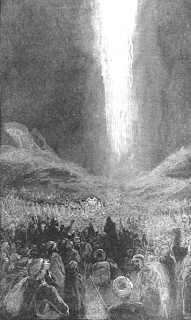TO CHEW ON: "For to me to live is Christ, and to die is gain." Philippians 1:21
I recently heard a saying that went something like, in a relationship, the one with the least amount to lose is the one with the power. In other words, the one that needs the other the least is the dominant one.
Paul's statements in Philippians 1:20-23 remind me of that saying. In his staring match with death, not only does he not blink, he even looks past death's unknowns, its scariness, its possibly painful portal, and sees advantages to dying: "...to die is gain... to depart and be with Christ, which is far better."
Of course there lives within us humans a natural instinct to protect ourselves and stay alive. If someone throws a punch, without thinking we duck, or punch back. If a person intentionally harms him- or herself, we search for cures to change the behaviour.
But there is nothing sick about Paul's wish to die and be with Jesus. He understands how Jesus' death took the sting out of death for us (see 1 Corinthians 15:51-58). Since his conversion to faith in Jesus' death and resurrection, he has lived with the single purpose of magnifying Christ in his body. Now he can't wait to see Jesus face to face.
A commentary about this passage in my Bible says: "Do not fear death because being in heaven with Jesus will be wonderful. Seek to live each day on earth for the purposes and glory of our Lord Jesus" - "Truth-In-Action through Philippians, New Spirit-Filled Life Bible, p. 1667.
PRAYER: Dear Jesus, thank You that Your death removed the sting of death for me. Help me to live my life so that I am ready to die and meet you at any time. Amen.
MORE: The Future Life
"When Victor Hugo was past eighty years of age he gave expression to his religious faith in these sublime sentences: 'I feel in myself the future life. I am like a forest which has been more than once cut down. The new shoots are livelier than ever. I am rising toward the sky. The sunshine is on my head. The earth gives me its generous sap, but Heaven lights me with its unknown worlds.
'... Winter is on my head, but eternal spring is in my heart. I breathe at this hour the fragrance of the lilacs, the violets, and the roses as at twenty years. The nearer I approach the end the plainer I hear around me the immortal symphonies of the worlds which invite me. It is marvelous, yet simple'" - quoted by Mrs. Charles E. Cowman in Streams in the Desert, May 31st reading - p. 165.







